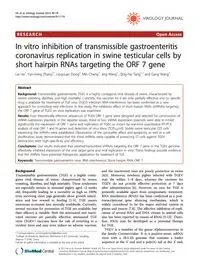
2012 In vitro inhibition of transmissible gastroenteritis coronavirus replication in swine testicular cells by short hai PDF
Preview 2012 In vitro inhibition of transmissible gastroenteritis coronavirus replication in swine testicular cells by short hai
RESEARCH Open Access In vitro inhibition of transmissible gastroenteritis coronavirus replication in swine testicular cells by short hairpin RNAs targeting the ORF 7 gene Lei He1, Yan-ming Zhang1*, Ling-juan Dong1, Min Cheng1, Jing Wang1, Qing-hai Tang1,2 and Gang Wang1 Abstract Background: Transmissible gastroenteritis (TGE) is a highly contagious viral disease of swine, characterized by severe vomiting, diarrhea, and high mortality. Currently, the vaccines for it are only partially effective and no specific drug is available for treatment of TGE virus (TGEV) infection. RNA interference has been confirmed as a new approach for controlling viral infections. In this study, the inhibitory effect of short hairpin RNAs (shRNAs) targeting the ORF 7 gene of TGEV on virus replication was examined. Results: Four theoretically effective sequences of TGEV ORF 7 gene were designed and selected for construction of shRNA expression plasmids. In the reporter assays, three of four shRNA expression plasmids were able to inhibit significantly the expression of ORF 7 gene and replication of TGEV, as shown by real-time quantitative RT-PCR analysis of viral ORF 7 and N genes and detection of virus titers (TCID50/ml). Stable swine testicular (ST) cells expressing the shRNAs were established. Observation of the cytopathic effect and apoptosis, as well as a cell proliferation assay demonstrated that the three shRNAs were capable of protecting ST cells against TGEV destruction, with high specificity and efficiency. Conclusions: Our results indicated that plasmid-transcribed shRNAs targeting the ORF 7 gene in the TGEV genome effectively inhibited expression of the viral target gene and viral replication in vitro. These findings provide evidence that the shRNAs have potential therapeutic application for treatment of TGE. Keywords: Transmissible gastroenteritis virus, RNA interference, Short hairpin RNA, ORF 7 Background Transmissible gastroenteritis (TGE) is a highly conta- gious viral disease of swine, characterized by severe vomiting, diarrhea, and high mortality. These syndromes are especially serious in neonatal piglets aged <2 weeks old, frequently leading to a mortality as high as 100%; even surviving older pigs generally show growth retard- ation and low reward to feeding [1-3]. TGE causes enormous economic loss annually worldwide. Currently, several vaccines for prevention of TGE are available, but their efficacy is variable. Both the attenuated and inacti- vated vaccines are partially effective; attenuated TGE virus (TGEV) vaccines have the risk of reverting to a virulent form and may even induce an adverse reaction, and the inactivated ones are poorly protective in swine [4,5]. Moreover, newborn piglets infected with TGEV may die within 1–4 days, whereas the vaccines for TGEV do not provide effective protection at 7 days after administration [6]. However, no cure for TGE is presently available apart from symptomatic treatment. RNA interference (RNAi) has been confirmed as a post- transcriptional gene silencing mechanism, which is widely considered to be the major antiviral system in plants and insects [7,8]. The effective inhibition of repli- cation of several RNA and DNA viruses in animal cells also has been reported by means of RNAi [9-13]. There- fore, RNAi may be developed as a potential therapy for TGE. TGEV is a member of the genus Alphacoronavirus in the family Coronaviridae. It is a positive-sense, ssRNA virus with a 28.5-kb genome that contains a leader sequence at the 50 end and a poly(A) tail at the 30 end, * Correspondence:
